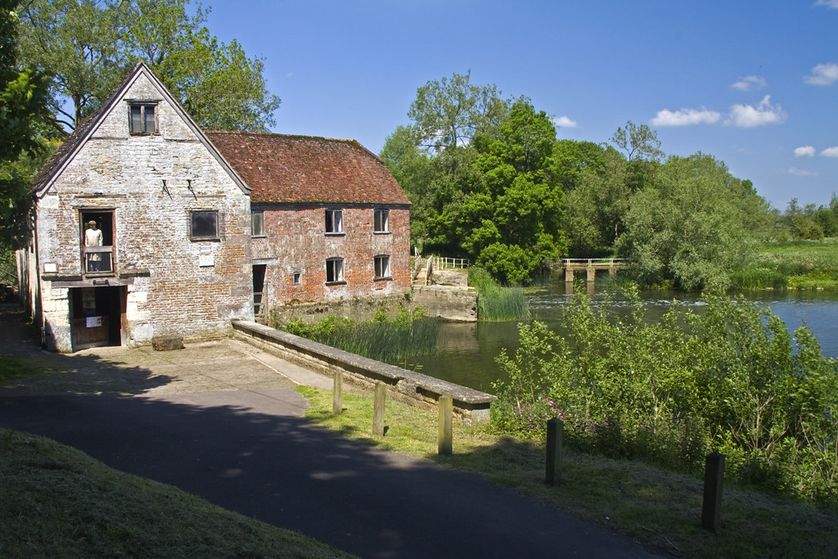JUDY WOODRUFF: And now the miller's tale. Among -- many of you will know that we have borrowed the title of this story from the medieval British poet Geoffrey Chaucer and his Canterbury Tales. Unlike that poem, full of adultery and trickery, we bring you a tale of uplift from a picturesque water mill from after Chaucer's era pressed back into service today to provide bakers and grocers fresh flour amid COVID-19 shortages. From the county of Dorset, 120 miles south West of London, special correspondent Malcolm Brabant reports.
MALCOLM BRABANT: At Sturminster Newton, the dawn chorus and torrent of the River Stour provide an eternal soundscape. For more than 1,000 years, various water mills have stood here, producing high-quality flour, first for aristocrats, then the most powerful medieval monastery in England, and now, during the dark ages of COVID-19, ordinary folk like thee and me.
PETE LOOSMORE, Head Miller, Sturminster Newton Mill: If you could bring back the miller who was here in those days 1,000 years ago, and stand him by the millstones, he'd know exactly how they worked. So things haven't changed very much as far as milling process is concerned, over that time.
MALCOLM BRABANT: Retired art teacher Pete Loosmore cranks up the water turbine that replaced the traditional water wheel over a century ago.
PETE LOOSMORE: We have absolutely every scrap of the grain that goes into the millstones is actually used in the flour, so nothing is sieved out. We have the whole grain. And nothing is added as well. So, what we produce here in the way of flour is an absolutely pure flour, no additives whatsoever.
MALCOLM BRABANT: During the lockdown, there haven't been that many food shortages, but one staple that's been rather hard to find has been flour. And that's largely due to the popular British pastime of home baking. So, during the lockdown, people have been sourcing flour from wherever they can to make bread, cakes and pies. And stop yourself right there, because I know exactly what you're thinking. Who ate all the pies? The 500-year-old mill is normally a museum, only grinding small quantities of flour for visitors. But Loosmore stepped up production when the supply chain for local bakers and supermarkets collapsed.
PETE LOOSMORE: They didn't seem to be able to restock. And here we were, ready for the next season, with something like a ton of grain stored away in the roof. We had the facility to make that grain into flour, and local people needed it.
MALCOLM BRABANT: The mill's flour has been a godsend for this nearby artisan bakery, which set up a drive-in service to kick-start business.
SUE HARRIS, Customer: My husband likes white sliced, unfortunately. And that is just revolting. I mean, it's horrible texture, and it's got no flavor at all really.
So, this is just...and it's sort of...it's dense and it's chewy. And it makes wonderful toast, and it just fills you up. It's just good. And it feels good. And it's just nice to eat.

MALCOLM BRABANT: Dawn Harvey is buying flour to make sourdough. How much difference do you think it makes to the bread itself?
DAWN HARVEY, Customer: So, the way you can work, the feel of it, the way you can work it, and the taste is definitely better than the supermarket.
MALCOLM BRABANT: Baker Steve Oxford is reaping the benefits of the new simplicity.
STEVE OXFORD, Artisan Baker: The grain that's milled at Sturminster is done so in such a way that it's milled in a more gentle, old-fashioned, softer gentler way, on softer milling stones. So, hardly any of the nutrients is lost. And so what you get is a much better flavor, a superior loaf for bakers like me who use a long fermentation process to produce their breads. The mill is no good for very quickly produced bread, modern-day bread, but for a funny old bakery like ours, it's perfect.
MALCOLM BRABANT: The feedback delights artist and museum curator Imogen Bittner, enjoying a third career as a miller.
IMOGEN BITTNER, Sturminster Newton Mill: It's satisfying because you see the results straight away. It's not just about putting it through the millstones. There's a lot of sort of little techniques. It's the smell. It's the...the hearing how it is. It's just balancing everything to produce the flour. And it's almost like alchemy what comes out at the end.
MALCOLM BRABANT: Along with other entrepreneurs, Steve Oxford recognizes that COVID-19 has forced a major reappraisal of values.
STEVE OXFORD: What this situation has done is raised awareness about things we should be appreciative of, things that can step up, things that do help, things that are so important to the heritage of our country, and the fact that, actually, when the world falls apart, there are men that can speak to men and women that can speak to women, and do business, and get things moving without the need of corporations, without the need of mass production.
MALCOLM BRABANT: Imogen Bittner also sees positives emerging from the lockdown.
IMOGEN BITTNER: The lesson is, I think we should do that more often with all our foods. I mean, if you buy vegetables by the side of the road, they taste better. It's... we're importing so much. The commercial aspect of it kills the taste, I think. If you can get back to basics, then you get better-quality food.
MALCOLM BRABANT: Although the experiment suggests the mill has commercial potential, it is a historic landmark, and the sense here is that, once the crisis has subsided, this national treasure will return to semi-retirement. For the PBS NewsHour, I'm Malcolm Brabant in Sturminster Newton.
JUDY WOODRUFF: Such a great story. The only thing we miss when it's baking is the smell of that fresh bread.












